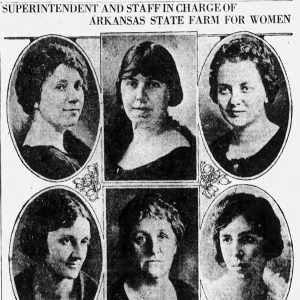calsfoundation@cals.org
Mary Dewees (1895–1977)
A renowned reformer and advocate for prisoners’ rights, Mary Dewees was the first superintendent of the Arkansas State Farm for Women, the state’s first women’s prison, from 1920 to 1924.
Mary Dewees was born on July 5, 1895, to Thomas B. Dewees and Lillie Dewees in Philadelphia, Pennsylvania. She graduated from Bucknell University, where she studied social work and became well versed in the latest forms of progressive penology, especially ways to reform so-called wayward women. Dewees became director of education at New Jersey’s Clinton Farms reform school for women in 1918. At the age of twenty-five, Dewees was recruited by Grace Robson, another women’s reform pioneer who helped organize New Jersey’s first women’s reformatory in 1919. The following year, Dewees was appointed as the first superintendent of the newly constructed Arkansas State Farm for Women by the state prison board. Robson’s sister, Lucy, was appointed assistant superintendent.
The Arkansas State Farm for Women was 2.5 miles northeast of Jacksonville (Pulaski County). Known colloquially as the “Pea Farm,” the 185-acre complex contained screened-in tents where inmates slept and a collection of buildings where they cooked, cleaned, canned vegetables, raised chickens, and laundered. When Dewees arrived in Arkansas, she implemented programs centering on rehabilitation rather than punishment. These programs sought to create a productive class of women who would dutifully contribute to the household and local economies when they were released. Like other educated, reform-minded women of the era, Dewees believed that a lack of feminine qualities led women to embrace a life of crime.
In October 1922, Dewees presented her philosophy on female criminality and reform at the American Prison Association annual meeting in Detroit, Michigan. The presentation followed a typical day in the life of an inmate at the Pea Farm. The inmate was bathed, dressed in a gingham dress like her peers, and given a complete medical examination. Every day, she woke up early and followed a strict schedule: from breakfast to ironing to sewing class and then lunch, classes, and evening activities. Other women hauled vegetables, repaired clothing, and set tables for dinner. “The strictest discipline,” Dewees told a reporter, “[is] maintained through the simple expedient of making every inmate share in the responsibilities of a home.” Dewees was known to keep a pistol on her at all times to protect the inmates from outsiders at the isolated prison.
Dewees left the Arkansas State Farm for Women in 1924 and moved back north, where she served as assistant superintendent of the New Jersey State Home for Girls in Trenton. From 1930 to 1938, she served as superintendent of the Delaware Industrial School for Girls in Claymont, Delware, and then as superintendent of the New York State Training School for Girls in Hudson, New York. She never married. In November 1961, she retired as superintendent of the Woods Haven-Kruse School for Girls in Wilmington, Delaware. She died in September 1977 and is buried in the Rushville Cemetery in Rushville, Pennsylvania.
For additional information:
Chambers, Erle. “Correctional Institutions.” In Arkansas and Its People: A History, 1541–1930, vol. 2, edited by David Thomas. New York: The American Historical Society, Inc.: 1930.
“Choose New Head for Girls’ School.” Morning News (Wilmington, Delaware), January 10, 1930, p. 2.
Dewees, Mary. “The Training of the Delinquent Woman.” In Proceedings of the Annual Congress of the American Prison Association. New York: American Prison Association, 1922.
Frank, William P. “Mary Dewees Built Reputation with Guns in Ozarks.” Morning News (Wilmington, Delaware), September 28, 1961, p. 3.
“Head of Girls’ School Resigns.” Morning News (Wilmington, Delaware), January 21, 1938, p. 2.
Tallqvist, K. G. “Kaleidoscopic Review of a Visit to the Arkansas State Farm for Women.” Arkansas Democrat, December 31, 1922, p. 29.
———. “Superintendent and Staff in Charge of Arkansas State Farm for Women.” Arkansas Democrat, December 24, 1922, p. 23.
———. “State Farm Board for Women Outlines Needs.” Arkansas Democrat, January 14, 1923, p. 19.
Ryan Anthony Smith
University of Arkansas, Fayetteville






Comments
No comments on this entry yet.